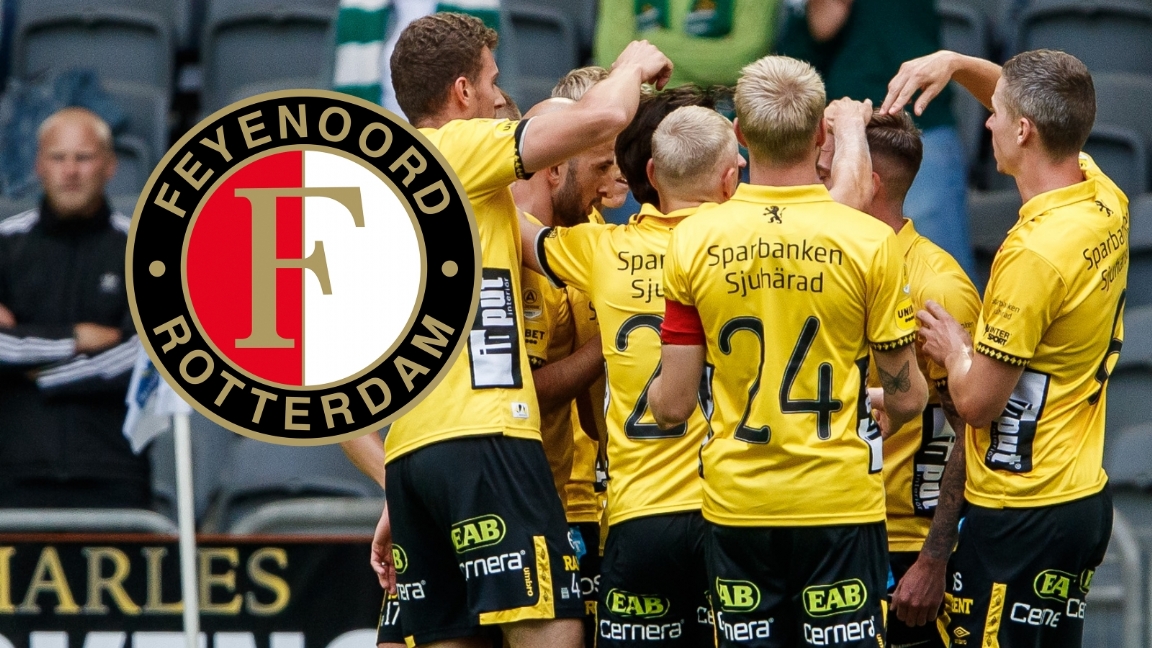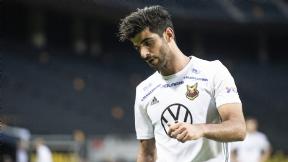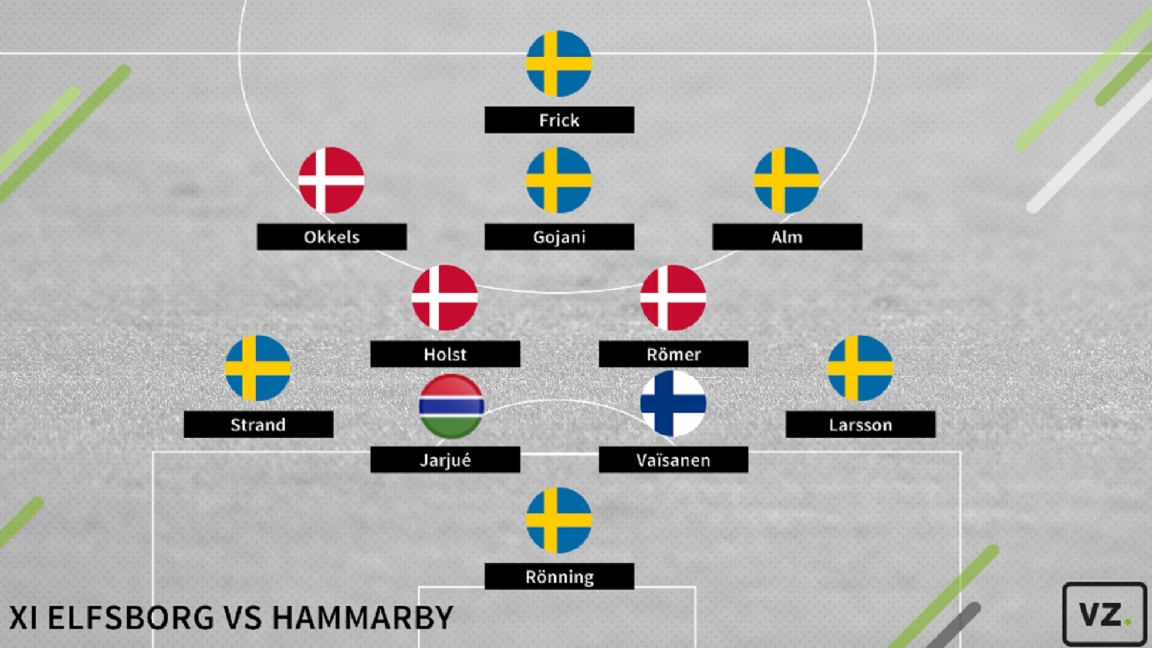![]()

IF Elfsborg is the last obstacle for Feyenoord on the way to the group stage of the Conference League. Di Gule, in other words the Gelen, last season qualified as Sweden’s number two for European football and with the current third place in the Allsvenskan also perform excellently in this year. Rewan Amin, player of the Swedish Östersunds FK, says that Feyenoord will have to deal with a team that has been on the rise for years with a clear identity.
By Chris Meijer
Elfsborg does not evoke the best memories in Amin. Almost exactly a year ago, during the away game against Elfsborg on the artificial turf of the Boras Arena, he suffered a cruciate ligament injury, from which he was currently still recovering. “The injury was not lucky, but the opponent. Well. Of course, when I hear Elfsborg, I think of that moment. But that’s not necessarily because of Elfsborg,” Amin puts into perspective. In the past year, the focus has been mainly on his rehabilitation and less on current affairs in the Allsvenskan, but nevertheless the 25-year-old midfielder has come to know Elfsborg well in recent years.
“They have been on a wonderful upward trajectory since I played in Sweden and finished second behind Malmö last season, which is a top performance in my eyes,” said Amin. He exchanged sc Heerenveen in February 2017 for Dalkurd FF and made a transfer to Östersunds FK a year and a half later. Since then, Elfsborg finished eighth, twelfth, eighth and second at the highest level in Sweden. The architect of the advance since 2018 is trainer Jimmy Thelin, who was taken away from second-level Jönköpings Södra IF. He has ground in a recognizable 4-5-1 system at Elfsborg. The composition of his midfield – two or three attacking midfielders – depends on the opponent
“Elfsborg is known as a club that is difficult to play. There is a culture in which everyone goes all the way, for example if you look at how the strikers put pressure. Everyone participates. If you compare it with the European top, the playing style is a bit the same as that of Atlético Madrid. But they also have the necessary qualities in the group. It really is a combination of struggle and quality. Good club, yes”, says Amin. “If you follow it from the outside, you notice that they make great strides every year. It seems very stable, the playing style is getting better every year. That gives you something to hold on to. You have a lot of different clubs and playing styles in Sweden, so it definitely helps if you have a certain identity.”

‘I was part of the the Dutch youth teams, but I fell short to really join’
In March, Voetbalzone spoke extensively with Rewan Amin about his adventure in Sweden.
Elfsborg has supplied the necessary players to the Eredivisie in recent years. Ibrahim Dresevic and Rami Kaib made the switch to sc Heerenveen, while AZ Jesper Karlsson picked up in Boras a year ago. “That was a player who had the individual qualities to suddenly do something out of the blue”, says Amin about Karlsson. In addition to the current attacker, Elfsborg also lost Kaib, Gustav Henriksson (to Wolfsberger AC), Sivert Heltne Nilsen (to SK Brann) and Joseph Okumu (to AA Gent) last year. For them, Iceland international Sveinn Aron Gudjohnsen (from Spezia), Iceland youth international Hákon Rafn Valdimarsson (from Grótta), Danish youth international Jeppe Okkels (from Silkeborg) and Gustaf Lagerbielke (from Västerås SK) were brought back.
“I played at Dalkurd with Simon Strand, the left back. That’s a good player, strong and fast. But I think that all in all they have to rely mainly on the strength of the team”, replies Amin when asked about the players to watch out for on the side of Elfsborg. With captain Johan Larsson, acquisition Lagerbielke, Per Frick, Robert Gojani, Tim Rönning, Samuel Holmén, Marokhy Ndione, Ahmed Qasem and Simon Olsson, the selection houses a considerable number of players with (youth) international matches for Sweden to their name. Furthermore, Leo Väisänen has a past in the Netherlands, because the 24-year-old center defender annex Finnish international played for FC Den Bosch between 2018 and 2020.

The position of Elfsborg in the 0-2 won away match against Hammarby.
Feyenoord will have to deal with an artificial turf field during the return in the Boras Arena. “It might be a bit of an old-fashioned stadium. It is very big, but some corners are open. I think it takes some getting used to for Feyenoord to play on that artificial grass. We play on artificial grass at home and if you then play somewhere on natural grass, it takes some getting used to. In Sweden it is a bit different, because many teams play on artificial grass. In the Netherlands you only have two or three clubs on artificial grass, so it takes some getting used to for Feyenoord to play on it.”
The difference could already be made in the first leg in De Kuip, although Elfsborg travels to Rotterdam in good shape. Elfsborg won 0-2 against Hammarby IF last weekend and is therefore already unbeaten in eleven games. In the Allsvenskan running over the calendar year, Elfsborg now occupies third place, four points behind leader Djurgardens IF. The Swedes settled in the first two preliminary rounds of the Conference League with the Moldovan FC Milsami Orhei (4-0 and 0-5) and the Bosnian Velez Mostar (1-1 and 1-4). “Elfsborg is a tough team, as I know them. So I’m curious if they’re going to lose by big numbers. This is not obvious in their compact playing style. Any team that digs in and can go all the way is hard to play. I am curious what Elfsborg will do and what Feyenoord will do in return. I have never played against Feyenoord and in the Eredivisie, so I find it difficult to compare the level. In terms of club, Feyenoord is the favorite. In any case, it is an interesting indicator.”
